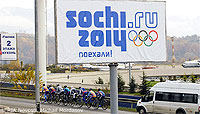RIA Novosti: Study Suggests Russian Medal Count to Be Boosted by Home Advantage

MOSCOW, February 4 (RIA Novosti) – A new study on the scientific basis of the home advantage in sports suggests that the Russian medal count at the Sochi Games opening Friday might be boosted by psychological effects.
“Game location has a powerful influence on performance outcomes in sport,” British scientists Mark S. Allen and Marc V. Jones wrote.
The study, published in the journal Current Directions in Psychological Science, summarizes the scientific community’s understanding of why sports teams perform better at home than while traveling.
Some of the effects are well understood, such as the statistical fact that referees rule in favor of home teams more often. Citing previous work, the authors suggest that game officials respond to the influence of an applauding or shouting audience in making their decisions.
The authors also note that stress from travel can weaken athletes’ performance, as can unfamiliarity with sports venues.
Allen and Jones, researchers at London South Bank University and the University of Staffordshire respectively, also claim that athletes might respond to perceived incursions into their home territory in animalistic fashion based on findings that show testosterone levels are higher in soccer players prior to home games.
High testosterone levels can cause increased aggressiveness, risk-taking and spatial ability.
But the scientists noted that not all effects of performing on home turf are beneficial.
A home audience with high expectations may cause performance anxiety that forces athletes to focus on actions they normally perform subconsciously causing them to choke up at critical moments.
And the effects, if any, will likely be temporary. A study of the boost that host nations receive in their medal counts has shown that they drop in subsequent Olympic Games.
Just what impact the home advantage will have on Russia’s performance in Sochi remains unclear.
Vitaly Mutko, the country’s sports minister, said in 2012 that “it’s mandatory to use the home advantage in Sochi.”
Russia won only three golds and 15 medals overall at the 2010 Vancouver Winter Olympics, in what was widely seen as a national disappointment.
One of the studies cited by the new article showed that the UK’s surprisingly high medal count at the London 2012 Olympics was in line with mathematical models that take the host nation’s advantage into account.
A statistical analysis released Thursday by PricewaterhouseCoopers predicts that Russia will come in third place at the Sochi Games with 25 medals, just behind Germany with 26, but trailing the US with 35.
